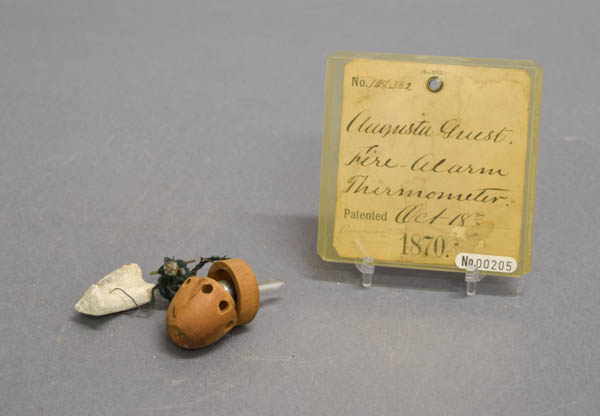One common question about patent model inventors is, “Were they successful?” For some well-known inventors such as Thomas Edison, the answer is yes. For others, it isn’t so easy to determine and perhaps their patent is all that is known about them. Whether the patent itself was successful, well that is another story.
With my interest in women inventors, Mrs. Augusta Guest drew my attention with her “Improvement in Fire-Alarm Thermometers.”
Born in 1839, she married John Henry Guest in 1861. For most of their lives, they resided in Brooklyn, New York boarding houses. In census records, John is listed as an electrician.

Patentee: Augusta Guest from Brooklyn, NY
Patent number 108,352; October 18, 1870
(2015.14.1236)
Two later improvements to her fire-alarm thermometer were patented to her husband with rights assigned to her. Turning attention to her husband, I found that he was a prolific and successful inventor himself with at least 45 patents dating from 1868 and 1904. This is the first married couple I have found with both of them having patents!
John Guest’s patenting changed over time. From 1868 to 1879, his patents focused on fire alarm and electrical thermostat improvements. Beginning in 1880 his inventions centered on electric lamps and improving some of Thomas Edison’s patents. Lastly in the 1890s his patenting efforts turned towards electric railways in Boston with at least 12 patents related to improving their supply systems and other areas.
With this success, you would expect them to have had a comfortable life but that wasn’t to be. The Brooklyn Daily Eagle on November 29, 1920 reported the sad and shocking end of their lives:
“Inventor, Aged 82, Dies with Wife in Suicide Pact”
“John Guest, 82 years old, an inventor, and his wife, Augusta, 80 were found dead in their furnished room in the house at 133 Felix St. this morning at 3 o’clock. The police believe they committed suicide by agreement. A note pinned to a Masonic apron that hung on a wall read: ‘Please bury this with me.’
“Guest is said to have made a fortune some years ago in devising an improvement to the electric light bulb, but lost his money through defending litigation over the patent. He has been blind and paralyzed for the past year, and the police believe the motive for the double suicide was Guest’s illness and his financial worries. They were found in bed, entwined in each other’s arms. Gas was pouring from all the jets in the room….”
Even though Guest's patented inventions were extremely successful, it was not enough in light of protecting his patent rights in court. My unproven suspicion is that these patent infringement cases involved Thomas Edison since Guest tried to improve Edison’s patents. In any case, a sad story.
Debra Hughes is the Curator of Collections and Exhibits at Hagley Museum and Library.
